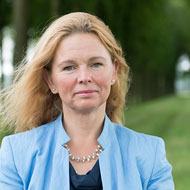World experts to discuss WSAVA study into wellness

Dr Nienke Endenburg will present the results of the study.
Veterinary wellness is set to go under the spotlight during the WSAVA World Congress in Toronto.
In a panel session called ‘Shaping the Future: Wellness in the Veterinary Profession,’ experts from across the globe will discuss the implications of research undertaken by the WSAVA’s Professional Wellness Group (PWG). The discussion takes place on Wednesday, 17 July and follows a survey of more than 4,000 veterinary professionals across the world.
PWG committee co-chair Dr Nienke Endenburg, who will present the results of the study, said: “Veterinarians care for our animal companions but the question is, who is caring for them? As a global community, we wanted to gain a clear understanding of the challenges to their well-being faced by our members around the world and to find out both what they have in common and where their experience differs.
“The results of our research provide a unique global view of this important issue and we look forward to discussing these with our expert colleagues and exploring practical solutions that respect the regional, economic and cultural differences of our membership. It will be an important first step towards bringing about positive change and enhancing the wellbeing of veterinarians globally.”
The PWG launched its online survey in 2018 in response to rising concern about the impact on veterinary professionals of their demanding working environment. The panel members taking part in the discussion include:
• Dr Marie Holowaychuk, a Canadian board-certified small animal emergency and critical care specialist and advocate for veterinary team wellbeing
• Dr Jen Brandt, the American Veterinary Medical Association’s Director of Member Wellness and Diversity Initiatives
• Dr Derick Chibeu, Co-chair of the PWG and Honorary Secretary of the Kenya Small and Companion Animal Veterinary Association
• Dr Vicki Lim, who works in New Zealand and is the founder of the Riptide Project, an international veterinary wellbeing initiative
• Mr Elwin van Oldenborgh, President-Elect of the International Veterinary Students’ Association.
WSAVA World Congress takes place in Toronto from 16-19 July.



 The veterinary mental health charity Vetlife is inviting the veterinary community to join it for a sponsored cold-water dip.
The veterinary mental health charity Vetlife is inviting the veterinary community to join it for a sponsored cold-water dip.